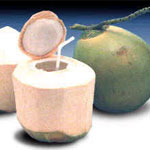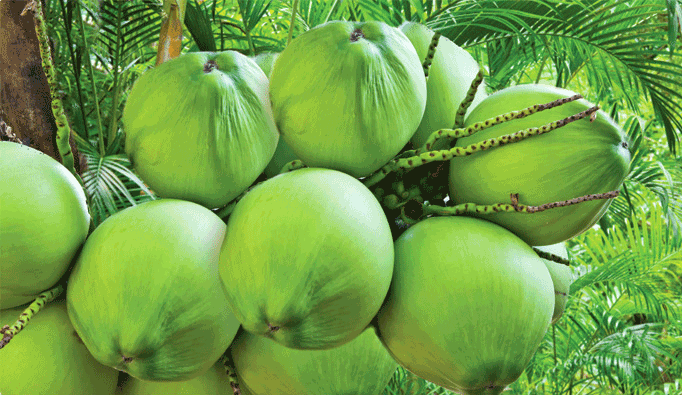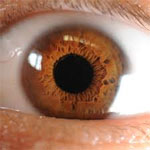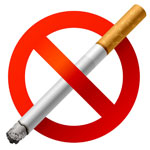
|
Associate Professor Vimol Srisukh Department of Food Chemistry, Faculty of Pharmacy, Mahidol University. Title image from : http://www.youngcoconuts.com/images/coconuts.jpg |
|
| 155,997 View 1 hours ago | |
| Publication date: 2016-10-13 |
Young coconut water (“tender coconut water” or “young coconut juice”) has long been known among Thai and Southeast Asian people, as well as Hawaiians. Nowadays, however, coconut water consumption is increasing worldwide and represents one of the fastest growing beverage categories due to its natural hydrating qualities, enhanced taste, functional health properties and nutritional benefits.  Image from : http://www.allthaifoods.net/vegetables/image/coconuts/YOUNG%20COCONUT%20ON%20TREE.jpg
Image from : http://www.allthaifoods.net/vegetables/image/coconuts/YOUNG%20COCONUT%20ON%20TREE.jpg
Young coconut water, the liquid endosperm, has a caloric value of 17.4/100 gram. Coconut water contains vitamin B such as nicotinic acid (B3) (0.64 microgram (μg)/milliliter (mL), pantothenic acid (B5) (0.52 μg/mL), biotin (0.02 μg/mL), riboflavin (B2) (<0.01 μg/mL), folic acid (0.003 μg/mL), trace amounts of thiamine (B1) and pyridoxine (B6). Other compounds are sugars, sugar alcohols, vitamin C, free amino acids, phytohormones (auxin, 1, 3 -diphenylurea, cytokinin), enzymes (acid phosphatase, catalase, dehydrogenase, diastase, peroxidase, RNA polymerases) and growth promoting factors.
As for the health benefits of young coconut water, most research studies are of animals, with a few in vitro studies and clinical studies as follows:
Can young coconut water be used to replenish the hormone levels in postmenopausal women?
Young coconut water contains a group of phytohormones, auxin (150.6 nanomolar(nM)), gibberellins (GAs) (54.5 nM), several cytokinins (186.12 nM), and abscisic acid (ABA) (65.5 nM). According to a study of ovariectomized rats (a model system for the menopausal condition) by a group of Thai researchers, it was found that the group of ovariectomized rats given young coconut water, at 100 milliliter (mL)mL/kilogram (kg) of body weight/day showed a hormone level that was not different from the group which received the exogenous estrogen (17β-estradiol) by intraperitoneal injection, at 2.5 μg/kg/day, twice a week. From the result, it could be suggested that young coconut water had the potential of increasing the hormone levels in humans. Further studies in humans are needed. The animal group, which was given 100 mL/kg/day of young coconut water and the exogenous estrogen, by intraperitoneal injection, at 2.5 μg/kg/day, twice a week, the estrogen-like hormones in the young coconut water competed with estradiol for the estrogen receptors, resulting in the lowest hormone level in the blood when compared with other groups. Studies in humans are needed to confirm if the hormone-increasing effect of young coconut water will work the same way as in the animal studies.
Can young coconut water be consumed to supply electrolytes?
Young coconut water is rich in minerals, the inorganic ions such as potassium (290 milligram percent (mg%)), sodium (42 mg%), calcium (44 mg%), magnesium (10 mg%), phosphorus (9.2 mg%), etc. It was believed that young coconut water could be consumed to supply the electrolytes. The high potassium content in coconut water is also reported to lower the blood pressure in a human study.
Can young coconut water prevent cardiovascular disease?
Young coconut water contains a high content of minerals, especially potassium. According to an animal study, young coconut water has been shown to be cardioprotective in an experimental myocardial infarction induced in rats and this was probably attributed to the rich content of mineral ions in coconut water, especially potassium. Coconut water contains folate, also known as vitamin B9. Lower blood levels of vitamin B6 and folate can increase the risk for atherosclerosis and other vascular diseases. Vitamin C in young coconut water also showed antioxidant activity. Studies in humans are still needed in the future.
Can young coconut water slow the ageing process?
Cytokinins in young coconut water are a class of phytohormones. Kinetin was the first cytokinin discovered. Kinetin showed strong anti-ageing effects on human skin cells and fruitflies (Zaprionus paravittiger). Kinetin also slowed down the ageing process, and prolonged the lifespan of fruitflies. Most importantly, the anti-ageing effects of kinetin did not increase the culture lifespan in term of maximum proliferative capacity in contrast to many other anti-ageing factors which are known to promote cancer under certain conditions. Kinetin was shown to delay the onset of several cellular and biochemical characterization associated to cellular ageing in human skin fibroblast cultures, therefore skin care products containing kinetin were later developed to treat photo-damaged skin. Furthermore, trans-zeatin, a member of cytokinin group, also exhibited anti-ageing effects on human fibroblast cells. This compound slowed the ageing process of fibroblast cells in human, as well. Further studies in humans are needed.
Can young coconut water be used in Alzheimer's disease or dementia?
Young coconut water contains trans-zeatin (181.93 nM in several forms), a member of cytokinin, a phytohormone group. It was found that trans-zeatin possessed an inhibitory effect against acetylcholinesterase (the enzyme involved in Alzheimer's disease) and might be used to treat Alzheimer's disease or related neural dysfunctions, such as dementia. It was also reported that trans-zeatin prevented amyloid β-protein formation, which had a causal role in the development and progress of Alzheimer's disease. Like kinetin, trans-zeatin also exhibited anti-ageing effects on human fibroblast cells. Studies in humans are still needed to confirm the anticholinesterase activity and amyloid β-protein inhibiting activity.
Can young coconut water lower cholesterol in the blood?
A study of male albino rats fed with a cholesterol diet, young coconut water and mature coconut water, at 4 mL/100 g of body weight, lowered total cholesterol, VLDL, and LDL cholesterol (the bad cholesterols), and triglycerides, while increasing HDL cholesterol which was the good cholesterol. Lipid levels in the tissue of liver, kidney, and aorta was markedly decreased. Coconut water supplement inhibited several enzymes which involved in the increase of lipid level. Coconut water also enhanced the activity of the enzymes involved in the decrease of lipid level. An increased rate of cholesterol conversion to bile acids and neutral sterols was observed in rats fed with coconut water. Tissues of liver and aorta showed much less fatty accumulation. L-arginine content in the blood, nitrite level in the urine, and nitric oxide activity showed an increase. Nitric oxide synthase normally changes L-arginine into nitric oxide which maintains the good condition of the blood vessel lining. A study, by the same group of Thai researchers, of male rats fed a fat-cholesterol enriched diet for 45 days, it was found that coconut water lowered the levels of the bad cholesterols and triglycerides similar to lovastatin , a lipid lowering drug (at 0.1 g/100 g diet).
Another study of ovariectomized rats found that young coconut water fed at 100 mL/kg body weight for 4 weeks, resulted in an increase in HDL cholesterol, but no changes in total cholesterol, LDL cholesterol or triglycerides.
The compounds that might be responsible for the lowering of plasma lipids included the free amino acid, L-arginine, vitamin C, and minerals such as calcium, magnesium, and potassium. Among these compounds, L-arginine might play a major role; young coconut (aged at 6 months) and mature coconut (10 months) contained 30 mg% and 150 mg%, respectively. From this, it could be interpreted that mature coconut water might have a stronger lowering activity, regarding the lipid level in the blood. L-arginine had been reported to significantly lower the lipid level and reduce atherosclerosis by increasing the function of nitric oxide. Other compounds which might involve in the lipid lowering effects include phytosterols such as stigmasterol, campesterol and β-sitosterol.
In conclusion, according to the animal studies, young coconut water increased the good cholesterol (HDL) both in male rats and female ovariectomized rats. But the lowering effects of the bad cholesterol and triglyceride were shown in the male rats only. Studies in humans are needed in the future to confirm this.
Does young coconut water improve skin complexion?
Young coconut water contains several phytohormones (see “anti-ageing effect”). According to a study by a group of Thai researchers, it was found that wound healing was significantly accelerated in ovariectomized rats (considered to represent a postmenopausal condition) when given 100 mL of young coconut water/ kg body weight/day. Another study by the same group of researchers showed that young coconut water increased the thickness of epidermis and dermis in the ovariectomized rats. However, at 100 mL/kg for 5 weeks, young coconut water supplementation resulted in glycogen accumulation in the liver cells. Thus, young coconut water might increase the risk of liver diseases in long-term consumption of young coconut water in postmenopausal women. Consequently, a recent study by the same group of researchers reported that in ovariectomized rat group, young coconut water was given at lower doses in various concentrations for 10 weeks, comparing with the control group and the group with estradiol benzoate injection (2.5 μg/kg body weight). Under a special electron microscope, it was found that young coconut water, at 10, 20, and 40 mL/kg/day, increased the thickness of the epidermis and dermis, as well as the number of hair follicles, and diameter of collagen fibers. Young coconut water, at 40 mL/kg body weight, was the most likely dose to improve skin complexion. Studies in humans are needed to obtain a safe and effective supplement dose for the postmenopausal women in order to improve skin complexion.
Does young coconut water improve bone condition?
Androgens, the male hormones, play an important role in building the skeleton, preventing bone loss and osteoporosis in ageing men. In elderly men, bone mass has been related to estrogen levels rather than to testosterone. Estrogen replacement therapy has, therefore, been proposed to prevent bone loss in males as well as females. But estrogen supplement has been implicated as a risk factor for an enlarged prostate gland and prostate cancer. In a study for possible beneficial effects of young coconut water in delaying osteoporosis, using a male rat model; mandibular condylar cartilage was used as the osteoporotic model. It was found that total cartilage was thickest in the control group (intact prostate) given 100 mL/kg/day of young coconut water, orally for 14 days. Another similar study, by the same group of researchers, showed that young coconut water, at 100 mL/kg for 14 days, resulted in increasing the thickness of the mandibular cancellous bone (lower jaw porous bone) in the intact prostate group and the orchidectomized rats. Studies in humans are needed in order to prove if young coconut water would be able to slow the osteoporosis in ageing men.
Another study showed that when young coconut water was given to ovariectomized rats, at 10 mL/kg body weight/day for 6 weeks. The bone mineral density of the left femur was significantly higher and the bone formation rate was higher than other groups, as well. The result suggested that young coconut water supplementation has a positive effect on bone metabolism and thus represents a possible intervention to slow the bone loss observed following menopause. Studies in humans are needed in the future.
Does young coconut water have any detrimental effect on liver and kidney ?
Since young coconut water contains high levels of glucose (45%) and fructose (44%), any excess of monosaccharides will be converted and accumulated as glycogen in the liver. However, according to an animal study in ovariectomized rats fed coconut water, at 100mL/kg body weight, glycogen accumulation was reported but there was no significant changes of the liver cells containing glycogen. In another study of ovariectomized rats given young coconut water, at 100 mL/kg/day, for 14 days, it was found that, under microscopic examination, no significant changes of the liver or kidney tissues were observed; the number of liver cells containing glycogen among the groups were not different. As for the blood biochemistry, it was found that in the ovariectomized rats given young coconut water, the results of the tests for the liver and kidney functions in the intact ovary group and the ovariectomized group were not significantly different from other groups.
Another study in male albino rats reported that there was much less fatty accumulation in rats fed coconut water. It was also reported that rats fed coconut water lead to a decreased activity of several liver enzymes. In conclusion, the longer the rats were fed with young coconut water, the lower the glycogen could be accumulated in the liver cells. These results indicated that fatty infiltration and degeneration of the liver cells caused by fat-cholesterol feeding were significantly reduced by coconut water.
Histopathological studies of liver in an earlier study showed that young coconut water possessed the hepatoprotective effect; the liver did not show any fatty infiltration or necrosis as observed in carbon tetrachloride-intoxicated rats. Studies in humans are still needed to ensure the safety of young coconut water when consumed over long periods of time and its effect on the liver and kidney functions.
In conclusion, according to the information on the content and the results of animal studies and studies of cell lines, several beneficial activities from consumption of young coconut water have been reported. These include mineral and phytohormone supplementation, cardioprotection, anti-ageing, and preventing/inhibiting the progress of Alzheimer's disease and dementia, etc. However, studies in humans are still needed to confirm these beneficial activities in animal studies and to obtain the safe and effective daily dose for humans.
(Note: edited by N.P. & V.P. of UK)
Reference
- Bueraheng N, Suwaluck S, Radenahmad N. Effects of young coconut juice on increasing skin thickness, collagen size and number of hair follicle in ovariectomized rats. The National and International Graduate Research Conference 2016: 742-50.
- DebMandal M, Mandal S. Coconut (Cocos nucifera L.: Areaceae): In health promotion and disease prevention. Asian Pacific J Trop Med 2011: 241-7.
- Effiong GS, Ebong PE, Eyong EU, Uwah AJ, Ekong UE. Amelioration of chloramphenicol induced toxicity in rats by coconut water. J Appl Sc Res 2010; 6(4): 331-5.
- Lima EB, Sousa CN. Cocos nucifera (L.) (Areaceae): A phytochemical and pharmacological review. Braz J Med Biol Res 2015; 48(11): 953-64.
- Loki AL, Rajamohan T. Hepatoprotective and antioxidant effect of tender coconut water on CCl4, induced liver injury in rats. Indian J Biochem Biophy 2003; 40: 354-7.
- McCullough JL, Weinstein GD. Clinical study of safety and efficacy of using topical kinetin 0.1% (Kinerase R) to treat photodamaged skin. Cosmetic Dermatol 2002; 15: 29-32.
- Minorsky PV. The hot and the classic. Kinetin: The elixir of life? Plant Physiol 2003; 132: 1135-6.
- Morii Y, Matsushita H, Minami A, Kanazawa H, Suzuki T, Subhadhirasakul S, Watanabe K, Wakatsuki A. Young coconut juice supplementation results in greater bone mass and bone formation indices in overiectomized rats: a preliminary study. Phytother Res 2015; 29: 1950-5.
- Radenahmad N, Sawangjaroen K, Mitranun W, Sayoh I. Beneficial effects of young coconut juice feeding on the lipid, renal and liver profiles, in ovariectomized rats: Preliminary novel findings. Songklanakarin J Sci Technol 2016; 38(1): 57-65.
- Radenahmad N, Vongvatcharanon U, Withyachumnarnkul B, Connor JR. Serum levels of 17β-estradiol in ovariectomized rats fed young-coconut-juice and its effect on wound healing. Songklanakarin J Sci Technol 2006; 28(5): 897-910.
- Rattan SIS. Method and composition for ameliorating the adverse effects of aging. US Pat. 5371089, 1994.
- Rattan SIS, Clark BFC. Kinetin delays the onset of ageing characteristics in human fibroblasts. Biochem Biophys Res Commun 1994; 201: 665-72.
- Sandhya N, Rajamohan T. Beneficial effects of coconut water feeding on lipid metabolism inn cholesterol-fed rats. J Medicinal Food 2006; 9(3): 400-7.
- Sandhya VG, Rajamohan T. Comparative evaluation of the hypolipidemic effects of coconut water and lovastatin in rats fed fat-cholesterol enriched diet. Food Chem Toxicol 2008; 46(12): 3586-92.
- Sharma SP, Kaur P, Rattan SIS. Plant growth hormone kinetin delays aging, prolongs the life span and slows down development of the fruitfly Zapronius paravittiger. Biochem Biophys Res Commun 1995; 216: 1067-71.
- Sharma SP, Kaur J, Rattan SIS. Increased longevity of kinetin-fed Zapronius fruitflies is accompanied by their reduced fecundity and enhanced catalase activity. Biochem Mol Biol Int 1997; 41: 869-75.
- Suwanpal P, Radenahmad N, Yusuh M, Eksontramate M, Ruangsri P, Chantanasuksilpa A. Effects of young-coconut juice on increasing mandibular cancellous bone in orchidectomized rats: Preliminary novel findings. Songklanakarin J Sci Technol 2011; 33(6): 617-23.
- Yong WJWH, Ce L, Ng YF, Tan SN. The chemical composition and biological properties of coconut (Cocos nucifera L.) Molecules 2009: 14: 5144-64.
- Yusuh M, Phochanukoon N, Radenahmad N, Eksomtramate M, Ruangsri P, Chatanasuksilpa A, Nitiruangjaras A. Changes of condyle cartilage on orchidectomized rats fed with young coconut juice: Novel preliminary finding. Songklanakarin J Sci Technol 2010; 32(4): 33-9.
Recommended articles

|
Top 10 Selenium-Rich Foods & Health Benefit 16 minutes ago |

|
Thai Traditional Medicine Theory in Relation to Seasons Part 1 17 minutes ago |

|
AMD.. what to eat to delay it? 29 minutes ago |

|
STOP SMOKING with Nicotine Replacement Therapy 1 hours ago |

|
Top 10 Potassium-Rich Foods & Health Benefit 2 hours ago |

|
Stevia: Natural sweetness...sweetener of choice 2 hours ago |

|
Can probiotics survive under medication treatments? 2 hours ago |

|
Drugs that should be avoided in patients with dementia 3 hours ago |

|
Thai Traditional Medicine Theory in Relation to Seasons Part 3 3 hours ago |

|
Food allergy in children:a brief information for new parents 4 hours ago |
